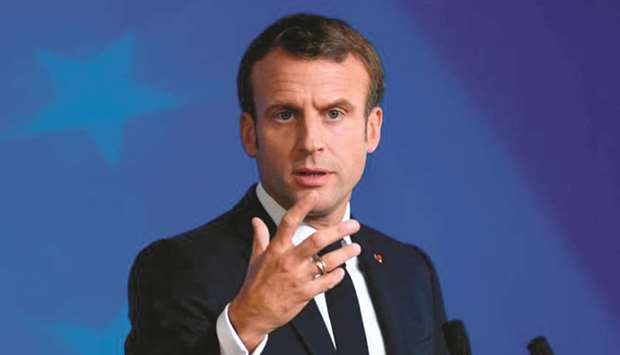French President Emmanuel Macron has said that he believed the North Atlantic Treaty Organisation (Nato) is undergoing “brain death”, lamenting a lack of co-ordination between Europe and the United States and unilateral action in Syria by key member Turkey, in an interview published yesterday.
“What we are currently experiencing is the brain death of Nato,” he told The Economist magazine.
The president’s explosive comments, appearing to question the very future of Nato, threatened to send shock waves through the alliance ahead of a summit in Britain next month.
“You have no co-ordination whatsoever of strategic decision-making between the United States and its Nato allies. None,” said Macron.
“You have an unco-ordinated aggressive action by another Nato ally, Turkey, in an area where our interests are at stake,” he added, according to an English transcript released by The Economist.
Turkey’s latest military operation against Kurdish forces in northern Syria was staunchly opposed by fellow members like France, but made possible by a withdrawal of US forces ordered by President Donald Trump.
“There has been no Nato planning, nor any co-ordination,” Macron said.
And while Nato works well in communicating between armies and commanding operations, “strategically and politically, we need to recognise that we have a problem”, he said.
“We should reassess the reality of what Nato is, in light of the commitment of the United States,” he warned, adding that “In my opinion, Europe has the capacity to defend itself”.
Macron said that while “it’s not in our interest” to expel Turkey from Nato – as has been urged by some politicians – members states should “reconsider what Nato is”.
And he emphasised that it is crucial to seek a rapprochement with Moscow, which regards Nato and its expansion into former Communist bloc states with huge suspicion since the alliance was set up to counter the Union of Soviet Socialist Republics (USSR).
“We need to reopen a strategic dialogue, without being naive and which will take time, with Russia,” said Macron, who is seeking to broker an end to the conflict in Ukraine and has courted President Vladimir Putin as a partner.
He said that Nato did not reexamine its future in the early 1990s after the collapse of the Soviet Union and “the unarticulated assumption is that the enemy is still Russia”.
“So, the question about the present purpose of Nato is a real question that needs to be asked”, especially by the United States where Trump sees the alliance as a “commercial project”, he said.
And Macron said he believed that Putin, for all the anti-Western bombast from the Kremlin, would find his strategic options limited, in the long term, to “a partnership project with Europe”.
“If we want to build peace in Europe, to rebuild European strategic autonomy, we need to reconsider our position with Russia,” said Macron.
He praised the stance on the issue of Hungarian Prime Minister Viktor Orban – criticised by many in Europe for being authoritarian and close to the Kremlin.
“He’s quite close to our views and has a key intellectual and political role” in central Europe, said Macron.
The French president, seen by analysts as Europe’s most prominent leader amid Brexit and the looming exit of German Chancellor Angela Merkel in 2021, has sought to stand tall on the foreign policy stage and implement a vision of reforming Europe.
However, he said that the European Union had been brought “to the edge of a precipice” by a dwindling focus since the mid-1990s on the bloc’s political integration.
“Europe has forgotten that it is a community, by increasingly thinking of itself as a market, with expansion as its end purpose,” said Macron, who recently blocked expanding the EU to include North Macedonia and Albania.
He also said he wanted European nations to break the “taboo” against using deficits to stimulate growth and investment, and scrap a strict limit on eurozone deficits.
Macron said it is a time of turmoil with Europe losing track of history, a risk of the US and China becoming the sole global powers, and authoritarian regimes emerging in its neighbourhood.
“All this has led to the exceptional fragility of Europe which, if it can’t think of itself as a global power, will disappear, because it will take a hard knock,” he said.
German Chancellor Merkel has rejected Macron’s viewpoint.
Macron used “drastic words” when he described Nato as experiencing a “brain death”, she said yesterday.
Nato Secretary-General Jens Stoltenberg also rejected the characterisation during a joint news conference in Berlin.
“Nato remains a cornerstone of our security,” Merkel told reporters after talks with Stoltenberg.
“I don’t think that such sweeping judgements are necessary, even if we have problems and need to pull together,” she added.
Stoltenberg meanwhile stressed that “Nato is strong”, adding that the United States and Europe “work together more than we have done for decades”.
Moscow has, however, hailed Macron’s comments.
“These are golden words ... a precise definition of the current state of Nato,” Russian foreign ministry spokeswoman Maria Zakharova wrote on her Facebook page.

Macron: We should reassess the reality of what Nato is.
